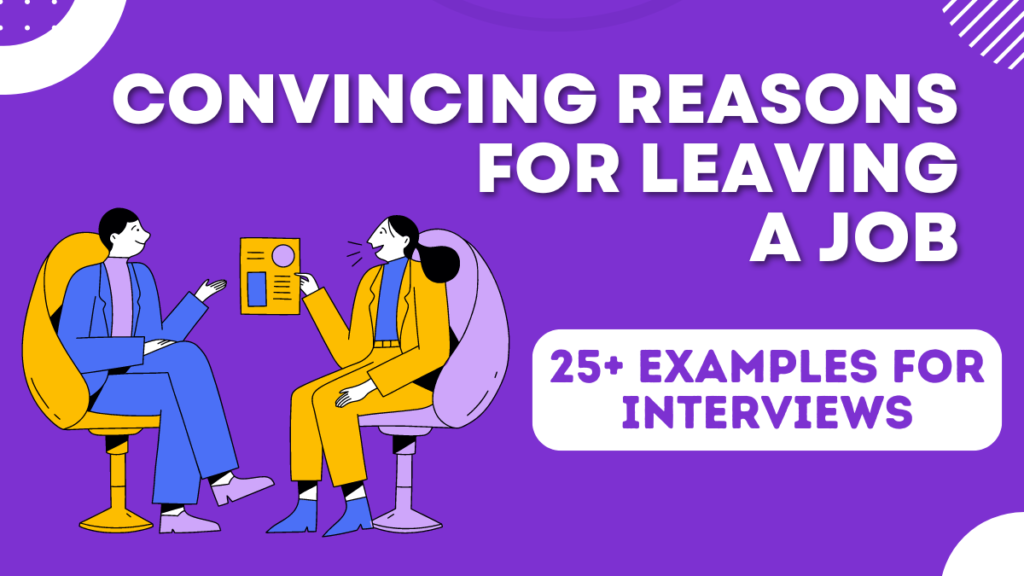
Job change is inevitable. And so IS, quitting.
Whether you’re happy or unhappy in your current position, you’ll eventually leave it for something better.
As per statistics, 1 out of 3 employees quit due to job dissatisfaction.
Perhaps you’re:
- Looking for a raise,
- A new challenge,
- Were burnt-out,
- Felt undervalued,
- Lost motivation,
- Or simply want a shift from your current position.
The reason for leaving a job could be any.
However, what you SHOULDN’T quit is integrity.
While interviewing for another job, one question that will ALWAYS come at you is, “Why did you leave your previous job?”
While you may be really tempted to shoot all the negative things about your previous job, it will only add drama to the story.
So what do you do instead? (of course, check out this article!)
Let’s get down to business.
21 Good Reasons For Leaving a Job (+Examples To Answer This Dreaded Question in Your Next Interview)
It is indeed challenging to come up with the “acceptable” reasons for quitting a job without coming across as rude to your previous employers, especially when they are justifiably wrong.
So, if you are wondering, what are good reasons for leaving a job, here are 21 reasons along with appropriate examples to understand how to write the reason for resignation!
Take a look.
1. You Were Dissatisfied
A VERY common reason to seek employment elsewhere involves underappreciation, feeling undervalued, or dissatisfaction.
It is demotivating if you are overlooked and underappreciated. You often go above and beyond, but your former employer never gave you a bonus or let alone, appreciated you.
That’s a very rational reason to leave a job.
Example:
"In my previous role, I found myself increasingly dissatisfied due to a lack of recognition and appreciation for the work I was doing. I consistently took on additional responsibilities and exceeded performance targets, but these efforts were not acknowledged. I believe in contributing to an organization where hard work is valued and rewarded. Therefore, I am seeking a new opportunity where my skills and contributions will be recognized and where I can continue to grow professionally."
2. You and Your Boss Have a Bad Relationship
Employees DON’T quit jobs, they QUIT employers.
Most long-term employment ceases to exist because of bosses who are short-tempered, are always micromanaging, or otherwise are a pain to be around.
Either way, nobody deserves to work in a toxic environment. You don’t need that long torment!
Example:
"While I value constructive feedback and leadership, my previous work environment was challenging due to a strained relationship with my manager. The constant micromanagement and lack of constructive communication created a toxic atmosphere that hindered my ability to perform effectively. I believe that a positive and supportive work environment is crucial for both personal and professional growth. I am now looking for a position where I can collaborate with a team that fosters mutual respect and open communication."
3. You Wanted a Career Growth
Promotion to a leadership position and a higher income are two main pillars of career advancement.
If you want to leave your job for a higher salary, you should phrase your motives as related to career advancement rather than stating explicitly.
Example:
"I am driven by opportunities for professional development and career advancement. In my previous role, I reached a point where there were limited opportunities for growth and progression. I am seeking a new challenge that will allow me to leverage my skills and experience in a leadership capacity, as well as provide opportunities for continuous learning and career advancement. I am particularly excited about the potential to contribute to and grow within your organization, where I can align my career goals with the company's vision and objectives."
4. Your Qualifications Are Way Too Much for the Job Role
There are always people who are overqualified for all jobs.
Suppose you landed a job where your most valuable traits and qualifications are going unused at your new job. You are just following orders and not participating in the role.
Eventually, the role starts feeling irrelevant. This is when you can quit to level up to the game.
Example:
"In my previous position, I found that my qualifications and experience were not fully utilized. While I appreciated the opportunity, I often felt under-challenged and unable to contribute at the level I am capable of. My skills in project management and strategic planning, for example, were not being applied, which led to a sense of stagnation. I am now seeking a role that better matches my qualifications and allows me to take on more responsibility, contribute to strategic initiatives, and fully leverage my expertise to add value to the organization."
5. You Left The Dream Job to Follow Your Passions
In case you’ve come to the realization that your “dream job” isn’t what you really want to do for a living, that’s one of the most appropriate reasons for leaving a job.
It just requires an appropriate justification, so be sure to bring it up positively in your interview.
Example:
"Although my previous role was in what I initially considered my 'dream job,' I realized over time that my true passion lies elsewhere. While I gained invaluable experience and developed many skills, I found myself increasingly drawn to a different field. After much reflection, I decided to pursue a career that aligns more closely with my passions and interests. I believe this change will allow me to bring more enthusiasm and creativity to my work, and I am excited about the opportunity to contribute my skills and passion to a new role that truly inspires me."
Related: If graphic designing is your passion and you’ve always wanted to be a graphic designer, do check out this comprehensive guide on how to become a graphic designer.
6. You Desire Higher Compensation
Let’s be honest.
Anybody would RUN to get better pay.
Now, even while it comes under the list of good reasons for leaving a job after 4 months, it’s not a good idea to bring it up during the interview process.
Therefore, avoid discussing money and focus on how the position you’re seeking better fits in with your overall skills and career objectives.
Example:
"While compensation is always a consideration, my primary reason for seeking a new opportunity is to find a role that better aligns with my skills and career goals. In my previous position, I reached a point where I felt my professional growth was limited. I am looking for a role that offers more challenging responsibilities and opportunities for advancement. I believe this position not only aligns well with my expertise but also provides a platform for me to continue developing and contributing meaningfully to the organization's success."
7. You Went Through a Relocation
Your spouse’s job, the needs of your aging parents, or any other factor can be the reason to relocate.
While it may fall under family reasons for leaving a job, it is perfectly OK to bring this up in an interview.
Even if you’re highly career-oriented, you might want to look for something else in a different city.
Example:
"Due to my spouse's job transfer, I recently relocated to a new city. While my previous role was fulfilling, the relocation made it necessary to seek new opportunities in this area. I am enthusiastic about the chance to join a new organization where I can continue to apply my skills and experience. I am particularly interested in this position because it aligns well with my career goals and offers an exciting opportunity to contribute to a new team in a new environment."
8. You Were Denied a Promotion
You put in a lot of time and effort over the years and you constantly took the lead on projects.
However, you were not promoted when the time arrived.
Instead, your boss promoted someone who wasn’t worthy or hired someone from the outside.
Either way, it’s one of the valid reasons for leaving a job.
Example:
"Over the years, I dedicated significant time and effort to my previous role, often taking the lead on key projects and consistently exceeding performance expectations. When a promotion opportunity arose, I was disappointed to find that it was given to an external hire. This experience made me realize the importance of working in an environment that values and recognizes internal talent and growth. I am now seeking a new opportunity where my contributions can be acknowledged and where there is a clear path for career advancement based on merit and performance."
9. You Wanted a Mentorship
It could be challenging to remain in a position that does not offer the required guidance, provided that you are a young professional.
If you are experienced and are looking to share your wealth of knowledge with younger colleagues, it’s ideal to work for a firm or in a position that values mentoring relationships.
This is an excellent justification for bringing up the list of reasons for leaving a job.
Example:
"As a young professional, I value continuous learning and development through mentorship. In my previous role, there were limited opportunities for mentorship and professional guidance. I believe that having access to experienced mentors is crucial for my career growth and development. I am seeking a new position where I can receive the guidance and support needed to hone my skills and where mentorship is actively encouraged. Additionally, as I gain more experience, I look forward to contributing back by mentoring others within the organization."
10. Your Career Goals and the Job Were Completely at Odds
There are instances when a job may not be a good fit for your professional goals, even if you enjoy working there.
Although you may have enjoyed your time as a video editor, pursuing that professionally may not be an ideal choice if you are ALSO pursuing a law degree.
Such instances create a clash between your current and future career objectives.
Example:
"While I enjoyed my previous role as a video editor and found the work fulfilling, I am currently pursuing a law degree, which represents my long-term career goal. The responsibilities and demands of my current job were increasingly at odds with my aspirations in the legal field. To align my professional path with my career objectives, I have decided to seek opportunities that are more closely related to my studies and future career as a lawyer. I am eager to bring my skills and dedication to a new role that supports my long-term goals."
11. Another Company Gave You a Better Deal
Any employee has the right to resign from their position if they receive a better offer from another employer.
When asked the reason behind quitting your job, you can bring up the fact that you were looking for new challenges and opportunities to help you grow in your field of work.
Example:
"I was approached by another company that offered a role with greater challenges and opportunities for professional growth. While I valued my time at my previous job and appreciated the experiences and skills I gained, the new offer aligned more closely with my career aspirations and provided a more substantial platform for my professional development. I am always eager to take on new challenges and continue growing in my field, and this new opportunity seemed like the right next step to achieve my career goals."
12. You Deserve a Better More Work-Life Balance
Nobody would blame you for seeking a job change if you’re struggling with maintaining the other things in your life.
Hiring managers are human. They can relate if you’re looking for a way to reduce work-related stress or simply want more leisure time to learn something new.
Finding a good work-life balance is indeed something that many employers would like in their employees as it improves productivity.
Example:
"In my previous role, I found it increasingly difficult to maintain a healthy work-life balance due to the demanding nature of the job. While I am dedicated to my work, I believe that having a balanced life outside of work is crucial for long-term productivity and well-being. I am seeking a new opportunity that not only challenges me professionally but also supports a healthier balance between my professional and personal life. I am confident that this approach will enable me to contribute more effectively and sustainably to the organization."
13. You Sense a Negative Shift in the Company’s Dynamics
Companies, like people, undergo changes with time.
Perhaps your ideal job was declared void when the company you worked for merged with another.
Or maybe the company’s culture underwent a radical shift when new leadership took over.
Whatever the case is, you have a good reason to quit.
Example:
"In my previous position, I noticed a significant shift in the company’s dynamics following a merger. The organizational culture and values that initially attracted me to the company changed dramatically, leading to a work environment that no longer aligned with my professional values and goals. This shift impacted team morale and overall productivity. I believe it is essential to work in an environment that aligns with my principles and fosters a positive culture. Therefore, I am seeking a new opportunity where I can contribute to a company that values its employees and maintains a supportive and dynamic workplace."
14. Your Family’s Situation Changed Dramatically
Having to rearrange your job role/schedule is a real possibility when you have familial responsibilities including marriage, looking after parents, etc.
While recruiters look for professional reasons for leaving a job, it is OK to quit in order to prioritize your family.
In fact, most employers respect and value employees who are committed to their families.
Example:
"Recently, my family's situation changed dramatically, requiring me to take on more responsibilities at home. This made it challenging to maintain the demanding schedule of my previous job. While I am highly dedicated to my career, I also believe in the importance of balancing professional and personal responsibilities. I am now seeking a position that offers more flexibility and understanding of family commitments, allowing me to effectively contribute to the organization while ensuring I can meet my family's needs. I am confident that this balance will enable me to be more productive and focused at work."
15. You and Your NEW Boss Don’t Get Along
There are instances where your former supervisors had faith in you to handle the workload, were charming and engaging, and were excellent leaders.
However, they somehow got replaced, and the new boss is nothing like them.
Although you thought you could keep going, it became toxic.
Your recruiter will definitely consider this as one of the acceptable reasons for leaving a job.
Example:
"When my previous supervisor, who was a great mentor and leader, was replaced, the dynamics of the team changed significantly. Unfortunately, my new boss and I had differing approaches and communication styles, which created a challenging work environment. Despite my efforts to adapt, the situation became increasingly toxic and affected my ability to perform at my best. I am now seeking a new opportunity where I can work under leadership that values collaboration, mutual respect, and effective communication. I believe this will enable me to contribute positively and grow within the organization."
16. You Got Laid Off
Layoffs happen all the time and are beyond your control.
Perhaps the software engineering firm you were employed by was recently taken over and the buyer decided to reduce its workforce.
Maybe your store had to minimize its costs by reducing the number of cashiers since their income has declined dramatically.
Whatever the case might be, telling the interviewer about it is perfectly fine.
Example:
"Unfortunately, my previous company underwent a significant restructuring after being acquired by another firm, which led to widespread layoffs, including my position. While this was beyond my control, it provided me with an opportunity to reflect on my career path and seek new challenges. I am looking for a role where I can bring my skills and experience to a dynamic and forward-thinking organization. I am excited about the possibility of contributing to your team and helping the company achieve its goals."
17. You Have Been Experiencing Personal Issues
Nobody can expect you to prioritize work more than anything else, let alone mental health.
If you had to quit your prior job due to a personal emergency, it is one of the best reasons for leaving a job because your family, health, and personal life are 3x times MORE important than work.
Example:
"Recently, I faced some personal challenges that required my full attention and made it difficult to maintain my professional responsibilities effectively. Prioritizing my health and well-being was essential during that period. Now that I have addressed these personal issues, I am fully ready and enthusiastic to re-enter the workforce. I am seeking a new opportunity where I can bring my renewed energy and focus to contribute positively to the team and organization."
18. You Need Stability
Feeling that your job security is in jeopardy is unsettling.
Perhaps the company’s budget was lowered, a large number of employees were laid off, and now you are unsure of your future with the company.
When faced with such uncertainty, it’s natural to seek out a position that provides more stability and security.
Example:
"In my previous role, the company faced financial difficulties, leading to significant budget cuts and layoffs. This created a lot of uncertainty about my job security and future with the company. I value stability and believe it is important for my professional growth and well-being. I am now seeking a position with a stable and well-established organization where I can contribute my skills and experience with the confidence that my role is secure. I am excited about the opportunity to join your team and help the company continue to thrive."
19. You are Interested in Doing Remote Work
There could be two instances here.
- One, you had the privilege of doing remote work, however you have not been granted one.
- Two, your firm has made new changes to its work-from-home policy, which means that you can no longer work remotely.
This is an acceptable justification for quitting your job.
Example:
"In my previous role, I greatly valued the flexibility and work-life balance that remote work provided. However, due to recent policy changes, the company no longer supports remote work, which has significantly impacted my ability to maintain that balance. I believe remote work allows me to be more productive and focused, and it is an important aspect of my work preference. I am now seeking a position that offers remote work options, enabling me to contribute effectively while maintaining a healthy work-life balance. I am confident that this arrangement will allow me to bring my best to the role."
Bonus: If you’re someone who loves remote jobs, check out the top 13 work from home jobs in 2024 that require ZERO experience!
20. The Job Didn’t Match the Description or Your Expectations
Let’s say you came across an ad that describes your dream job.
It offers:
- Competitive salary
- Fantastic work benefits
- An exciting work environment
- All the other perks you would desire.
However, things aren’t always as they seem when you first start working there.
The work you’re doing is tedious and has nothing to do with your future plans.
The boss is overly controlling and the work environment is just not conducive to success.
In short, it was neither what you expected, nor what it looked like.
This is one of the good reasons for leaving a job on application.
Example:
"When I accepted my previous role, I was excited about the opportunities it promised, such as a competitive salary, fantastic work benefits, and an engaging work environment. However, once I started, I realized that the actual responsibilities were not aligned with what was described in the job posting. The tasks were more monotonous and unrelated to my career aspirations. Additionally, the work environment was not as collaborative and supportive as I had hoped. Given these discrepancies, I decided to seek a new opportunity that better matches my skills, expectations, and career goals. I am confident that this position aligns well with what I am looking for and will allow me to thrive professionally."
21. You Got Fired!
How to answer why did you leave your last job if fired?
Alright, this isn’t as easy as the other reasons.
While getting fired has its own reasons, talking about it is the difficult part.
The reason behind getting fired does not matter.
What matters is that you use what you learned from your previous employer’s firing to your advantage, while sitting in front of the recruiter and explaining why they should hire you!
Example:
"In my previous role, I was let go due to a difference in expectations and fit for the position. While it was a challenging experience, it was also a valuable learning opportunity. I took the time to reflect on the feedback and have since worked on improving my skills and understanding of what is required to excel in such roles. This experience has made me more resilient and determined to find a position that better matches my strengths and career goals. I am excited about this opportunity because it aligns well with my expertise and the lessons I’ve learned, and I am confident that I can make a positive impact on your team."
What NOT to Say When Discussing The Reason For Leaving Your Job in an Interview?
NOT always “honesty is the best policy”.
Sometimes, the best policy is to manipulate it without being dishonest and disrespectful.
You cannot come up with personal reasons for leaving a job in front of your prospective employer.
To make your life easier, here is a list of what NOT to say while justifying your reasons for leaving a job.
While some of these may look familiar, do NOT burst your rage at any cost.
❌: “I just hate my boss. He was a prick.”
✅: “While I have enjoyed working for (Former Company), I am excited to explore opportunities where I can work alongside other industry leaders who foster growth and development in their teams.”
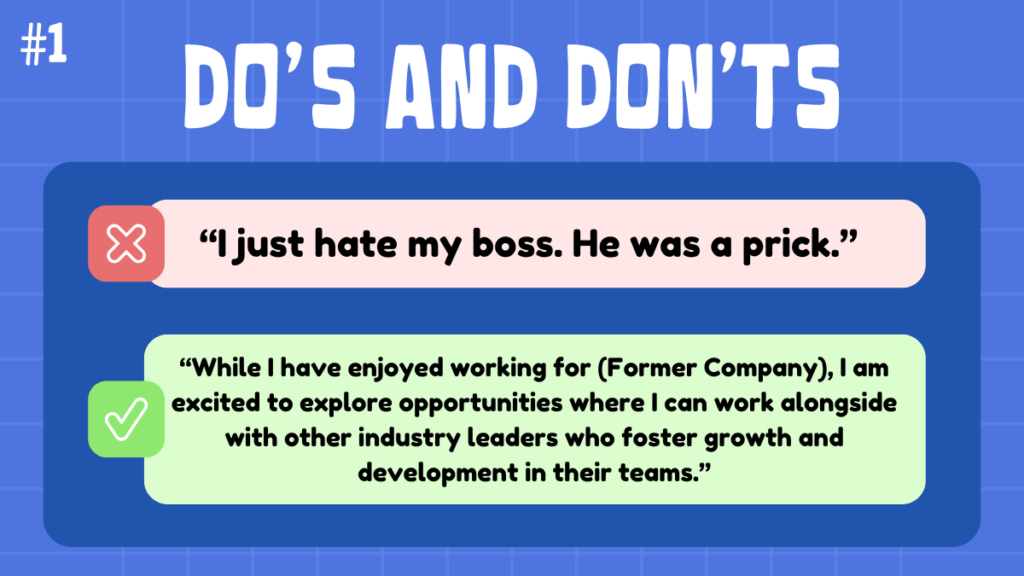
❌: “I just couldn’t take it anymore. I hated the job like anything.”
✅: “While my experience at a large company has been immensely valuable, I have come to realize that I thrive better in a smaller, more dynamic environment.”
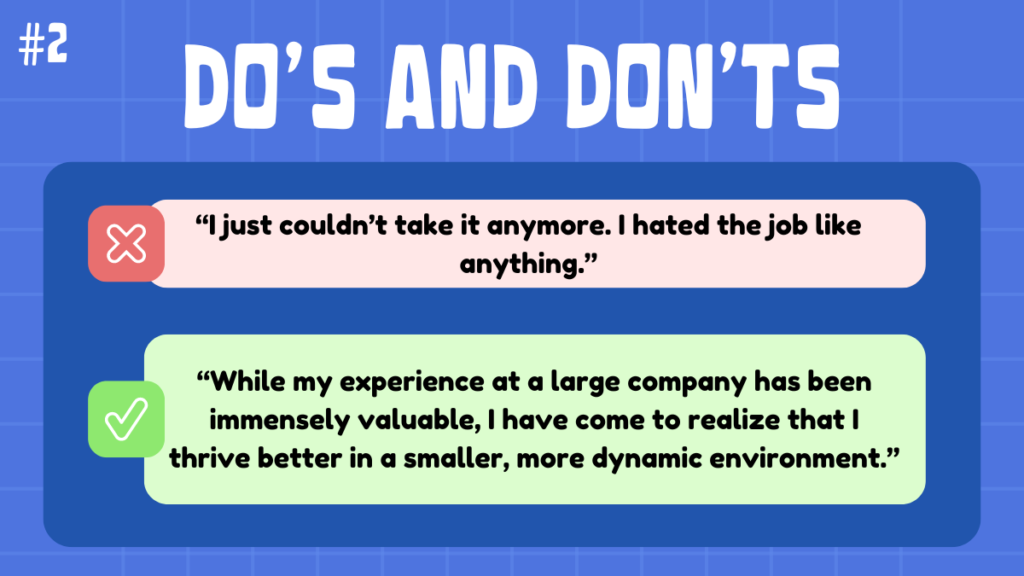
❌: “They never increased my salary.”
✅: “While I have gained valuable experience and received several promotions at (FORMER COMPANY), I am now seeking a role that offers greater opportunities for professional growth.”
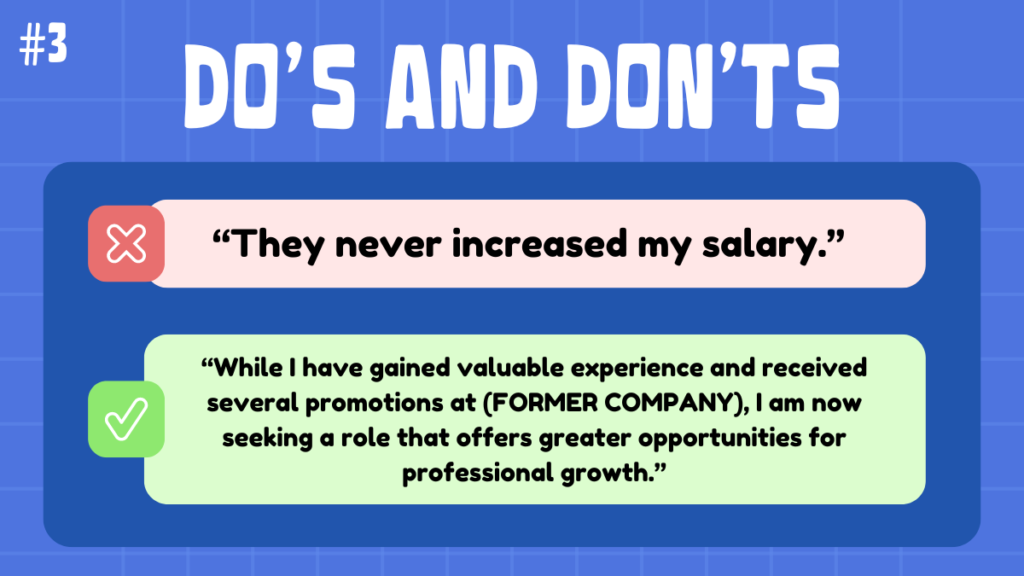
❌: “That workplace was toxic as hell.”
✅: “My previous role taught me a lot, but I’ve realized the importance of a work-life balance. I am now looking for a company that values and supports a healthy balance between work and personal life.”
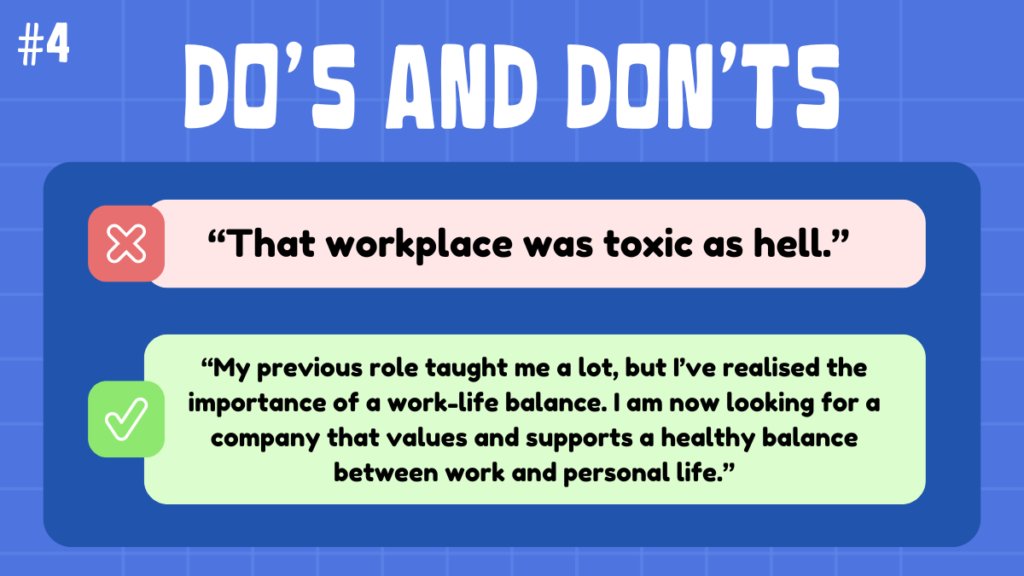
❌: “The work hours were dreadful and would take my peace away.”
✅: “I am excited to find a role with more balanced work hours, where I can excel professionally while still enjoying personal time outside of work.”
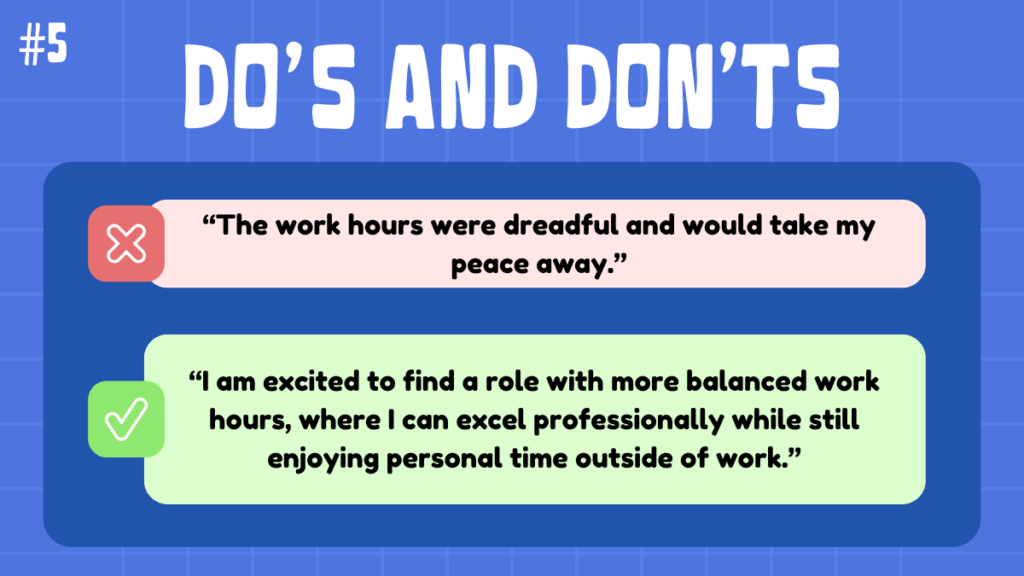
How to Explain Your Reason to Leave a Job Positively?
Being honest while maintaining diplomacy ISN’T easy.
However, it is important to control the situation tactfully while also making a good impression. It all comes down to how positively you keep your reason on the table.
Here are a few tips for how do you explain why you are leaving a job!
1. Refrain From Insulting Your Former Employer
For the third time, NEVER, under any situation, become so comfortable with an interviewer that you start spilling the beans about your previous employer.
Even though you feel you both could grab a beer and tell the interviewer everything about how awful your workplace was, you have to resist that temptation.
This is because your goal is to land the job, not diss your ex-boss.
2. Be Upbeat and Optimistic About Your Job
When asked why you are looking for a new job, start listing out the positives.
Give a brief review of your time there, including your accomplishments and growth.
Consequently, you can explain you’re leaving to take on new challenges and pursue new possibilities for career growth.
Starting on a positive note can help you stay focused on the reasons to put for leaving a job while moving forward, rather than dwelling on the negative ones.
3. Express Your Interest in the Current Position You’re Seeking
Start talking about your goals and vision, and how the company you are looking forward to working in perfectly sits with it.
Show that you are extremely career-focused and have done your homework in studying the firm.
Remember, your new employer is looking to fill a long-term position and wants to know if your career goals/ambitions align with the role and the company’s development path.
Keep a good mindset and highlight how your skills can benefit the company regardless of what happened at your previous job.
Why Does the Reason For Leaving Your Job Matter?
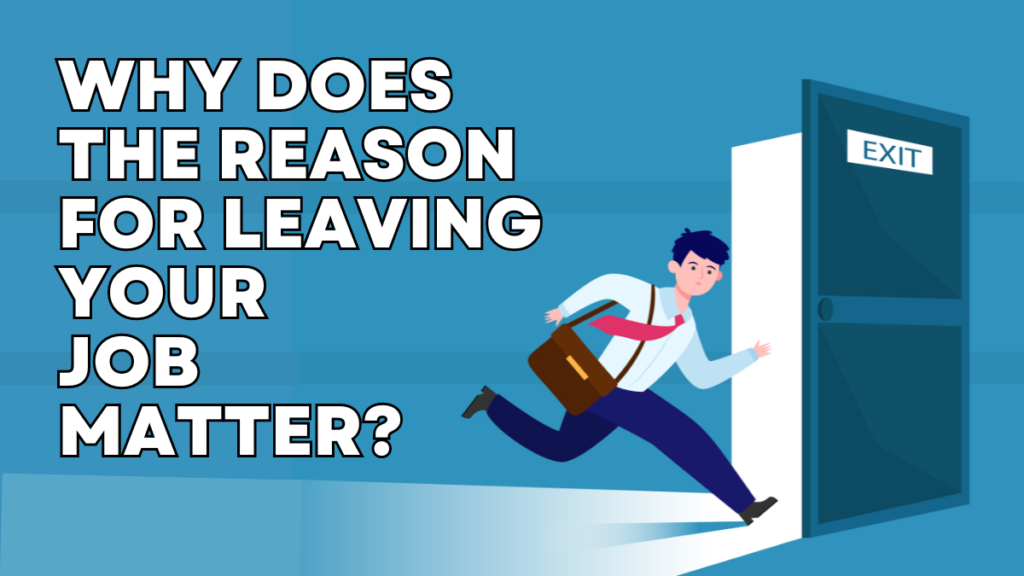
The whole point of this blog is that interviewers DO ask about the reasons for leaving a job no matter what.
So, here are a few potential reasons why recruiters ask this question and why it actually matters.
1. To Know if it Was a Resignation
The interviewer is interested in knowing if you voluntarily quit your position or if your company asked you to leave.
The interviewer wants to know if the resignation was compelled because of poor performance, disciplinary action, or some other reason like a merger, organizational changes, cost cutting, etc.
2. To Evaluate if You Quit For the Correct Reasons
Regardless of your designation, employers want to know the circumstances which led you to quit.
For instance, if you quit to focus on your hobbies, employers might be reluctant to hire you for a role requiring more maturity and responsibility.
On the contrary, resigning from your position because you were underutilized signifies your DESIRE for more responsibility and challenges.
While they may be impressed, they would be willing to determine whether you were truly underutilized.
3. To Know if You Were Fired
This is one of the most complicated subjects that may come up during an interview if you were actually fired.
Although many employers wouldn’t be interested in finding out the reason, many would like to know.
Even if your dismissal was unjust, it will still send a strong negative signal to potential employers.
4. To Evaluate Your Relations With Your Former Employer and Colleagues
Another reason for asking this question involves evaluating your relationship with your previous employer.
It may speak volumes about your attitude, professionalism, and communication skills if you are still on good terms with your previous employer.
5 Additional Tips for Explaining The Reason Behind Why You Left Your Job To The Interviewer
Bringing up this question in an interview provides hiring employers with a wealth of information regarding your very being.
This is why it is crucial that you enter the interview room well-prepared.
(There can be NO room for mistakes!)
Here are some tips on how do you answer why you leave your last job?
1. Jot Down Your Reasons First
Review your resume/CV and think about each of the reasons why you left your position.
Once you’re done, make sure you start filtering out the appropriate justifications that suit a professional setting.
For instance, it may not be the best idea to mention personal details like a work shift caused by a marriage.
You may instead state that you wanted to switch to a day shift if your previous job required you to work nights.
Pro Tip: If you’re someone who always gets confused between a CV vs a resume, then this blog is a must-read. (Maybe your interviewer might ask you this 😉)
2. Do NOT Expect the Interviewer Won’t Have Follow-up Questions
BE PREPARED.
Chances are, the interviewer can ask you more questions based on your reasons for leaving a job on your resume.
For instance, if you mention that you’re interested in a new role at the prospective firm, the interviewer will inquire if you applied for that position at your previous firm.
In a similar vein, if your reason to quit states that you had unresolved problems stemming from misunderstandings, the interviewer may inquire as to how you dealt with them or how you intend to avoid such problems in the future.
3. Avoid Unnecessary Routes
Get to the point quickly rather than beating around the bush and creating stories.
Just give a brief explanation of why you’re leaving/left.
Once you state the reason, quickly cover it up with your enthusiasm for the new company and your relevant qualifications for the prospective position right away.
4. Leave The Money Issue Off The Table
Make it seem as though you’re seeking better prospects for career advancement rather than better pay if that was your main reason behind leaving.
Discussing money in a public setting, especially while in an interview is considered inappropriate behavior.
5. Mention Why You’re The Perfect Fit
Whatever your reasons for leaving a job answer may be, try to emphasize how well this new firm fits YOUR needs.
Explain how you are the perfect fit for them.
One excellent method is to make a thorough comparison between what the prospect IS offering and what WAS lacking at your former firm.
Add every skill in your resume that compliments the job role. This can initiate a healthy discussion and will perfectly justify how the prospective firm can fill that gap.
Bonus: If you’re a fresher who is looking for a new job, check out this amazing blog on how to create a resume with NO experience.
Wrapping It Up
It is important to understand that EVERY professional has their own distinct reasons for quitting job.
What may seem rational for someone may be irrational to the other.
Whatever the circumstances might be, it is entirely situational and NO reason is irrelevant if it costs you your motivation and peace.
Yet again, rather than focusing on the past, it’s important to express your arguments in a professional, honest, and optimistic light, considering the future you want in the prospective firm.
Come up with the answer in such a way that highlights your career goals, what you’ve learned, how much more you’re willing to learn, and how you can contribute to your new position if given a chance!
For more such beginner-friendly career-oriented resources, stay connected with PenChise.
FAQs | What Are Good Reasons For Leaving A Job
1. What reasons can I give for leaving a job?
You can cite reasons like career growth, seeking new challenges, relocation, better work-life balance, desire for remote work, company restructuring, or personal issues. Emphasize positive aspects such as professional development, alignment with your skills, and finding a better fit for your career goals.
2. What are bad reasons for leaving a job?
Bad reasons for leaving a job include speaking negatively about your previous employer, citing personality conflicts without constructive context, leaving for trivial reasons, or focusing solely on financial gain. Avoid blaming colleagues or showing a lack of commitment, as these can reflect poorly on your professionalism.
3. How do I decide to leave a job?
Decide to leave a job by assessing your career goals, job satisfaction, work-life balance, and growth opportunities. Consider if your current role aligns with your long-term objectives. Evaluate the company’s stability, work environment, and if personal circumstances necessitate a change. Make a decision that supports your professional and personal well-being.
4. How to answer why you want to change your job?
Answer why you want to change your job by focusing on positive aspects such as seeking new challenges, career growth, better alignment with your skills, or professional development opportunities. Highlight your enthusiasm for the new role and how it matches your career aspirations and values. Avoid negative comments about your current employer.
5. What to put in a reason for leaving if fired?
When explaining why you were fired, focus on what you learned from the experience. Mention differences in expectations or fit, and highlight the steps you’ve taken to improve. Emphasize your growth and readiness to contribute positively to a new role, avoiding negative remarks about your previous employer.

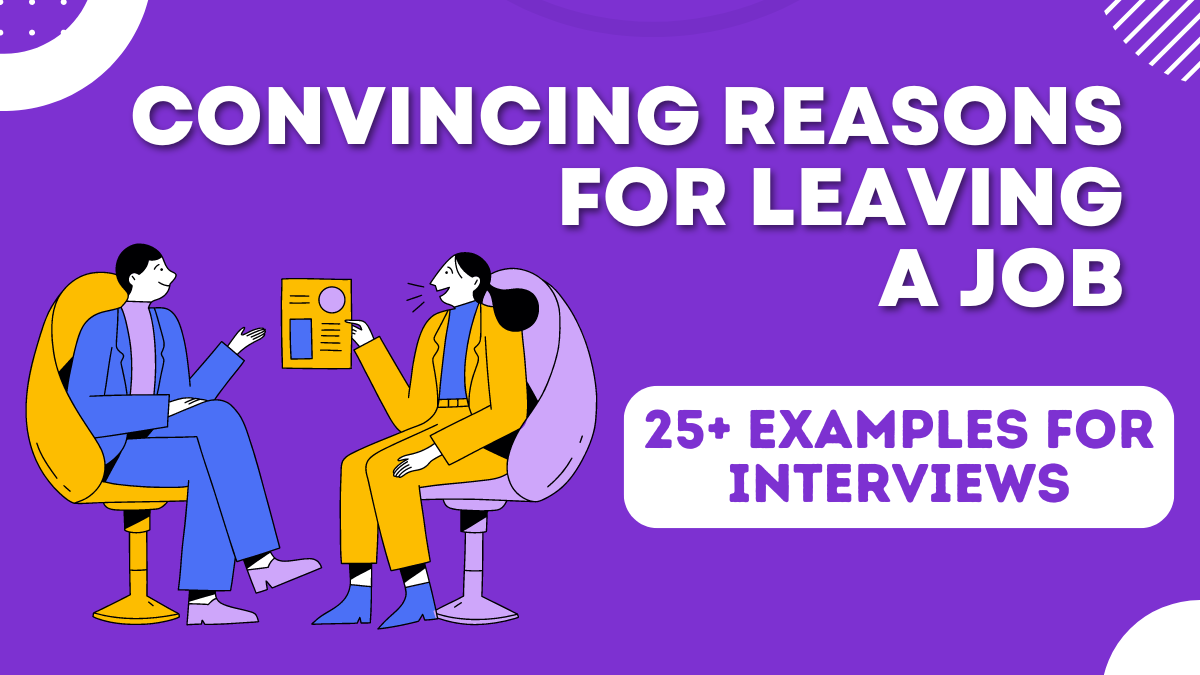
![Read more about the article How to Get a Job at Tesla in 2024 [Must-Have Career Guide]](https://penchisemoneyonline.com/wp-content/uploads/2024/09/How-to-Get-a-Job-at-Tesla-in-2024-300x169.png)

